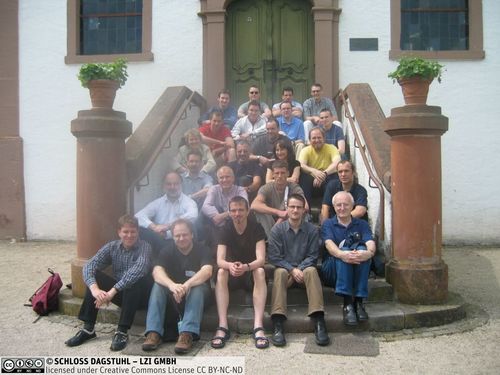Dagstuhl-Seminar 05181
Mobile Computing and Ambient Intelligence: The Challenge of Multimedia
( 01. May – 04. May, 2005 )
Permalink
Organisatoren
- Nigel Davies (Lancaster University, GB)
- Thomas Kirste (Universität Rostock, DE)
- Heidrun Schumann (Universität Rostock, DE)
Kontakt
Mobile computing gains in last years an increasing importance. It penetrates into new areas of everyday life. With increasing computing power that is available in recently developed mobile devices the mobile computing approach is used in new areas (where its use would not be possible few years ago). Due to specific properties of mobile devices the traditional approaches to the traditional schemes for communication between users and the devices are not applicable. This fact requires both development of new approaches for the design of user interfaces and also new approaches how the new possibilities of mobile computing should be used in particular applications, should be explored.
Another important issue that is linked with new applications in the field of mobile computing is derived from the fact that portable information appliances are pervading the everyday life and ambient intelligence is starting to surround us. Personal mobile guides and intelligent meeting rooms are examples of future smart environments that provide us with information and assistance, tailored to our individual needs, anytime, and anywhere. However, this also means that future infrastructures for multimodal interaction with multimedia information will be distributed and heterogeneous. Adapting multimedia applications and services to these delivery environments and enabling ensembles of multimedia appliances to organize themselves spontaneously and ad hoc will be major technical issues that have to be solved in near future. These problems were discussed during the Dagstuhl Seminar 05181 that took place in Schloss Dagstuhl from 01.05.05 to 04.05.05.
- Dirk Balfanz (ZGDV e. V. - Darmstadt, DE)
- Birgit Bomsdorf (FernUniversität in Hagen, DE)
- Andreas Butz (LMU München, DE) [dblp]
- Tim Clerckx (Hasselt University - Diepenbeek, BE)
- Nigel Davies (Lancaster University, GB) [dblp]
- Gerrit de Boer (Robert Bosch GmbH - Hildesheim, DE)
- Peter Forbrig (Universität Rostock, DE)
- Georg Fuchs (Universität Rostock, DE)
- Thomas Heider (Universität Rostock, DE)
- Michael Hellenschmidt (Fraunhofer Institut - Darmstadt, DE)
- Joaquim A. Jorge (Technical University of Lisboa, PT)
- Thomas Kirste (Universität Rostock, DE) [dblp]
- Antonio Krüger (Universität Münster, DE) [dblp]
- Winfried Lamersdorf (Universität Hamburg, DE) [dblp]
- Kris Luyten (Hasselt University - Diepenbeek, BE) [dblp]
- Rainer Malaka (HITS gGmbH - Heidelberg, DE)
- Zdenek Mikovec (Czech Technical University in Prague, CZ)
- Erik G. Nilsson (SINTEF ICT - Oslo, NO)
- Uwe Rauschenbach (Siemens AG - München, DE)
- Daniel Reichart (Universität Rostock, DE)
- Johan Sanneblad (Viktoria Institute - Göteborg, SE)
- Dirk Schnelle (TU Darmstadt, DE)
- Heidrun Schumann (Universität Rostock, DE) [dblp]
- Pavel Slavik (Czech Technical University in Prague, CZ)
- Christian Stary (Universität Linz, AT)
Schlagworte
- Mobile computing
- ambient intelligence
- multimedia


